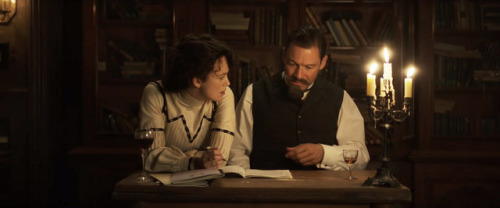 |
| Watch it, I'm writing here! |
The story begins in rural France as teenage Gabrielle Colette is courted by worldly Parisian writer Henri Gauthier-Villars, better known by his pen name 'Willy'. Despite the significant age difference between the two and rumors surrounding Willy's libertine lifestyle, her parents consent to the marriage in hopes of alleviating their financial troubles. The couple then travel to Paris where Gabrielle learns that her husband owes his literary success to a series of ghost writers working under his name. She is also dismayed to learn that his supposedly flourishing brand is facing financial difficulties. Before long, the artistically inclined Gabrielle is recruited to join the ranks of ghost writers working under Willy's name. To both husband and wife's astonishment her semi-autobiographical first novel, Claudine, proves to be a runaway commercial and critical hit. The pair's professional success soon puts a strain on their already fraught marriage, however as Gabrielle becomes increasingly determined to write under her own name. The film then goes on to chart her struggle to find her social, sexual, and creative identity as she is transformed from complacent and sheltered Gabrielle to fiery trendsetter Colette.
The film breathes new life into the classic period piece by relating its startlingly contemporary story with a wit and style worthy of its subject. Although the film does contain the customary dazzling costumes and tranquil landscapes typical of the genre, the acting and writing remain at center stage. As a result, viewers are able to fully engage with the film's multidimensional heroine to the fullest extent and gain insight into both Gabrielle the woman and Colette the writer. The script and performances combine to lend depth and complexity to each character, creating the illusion that actual lives are unfolding on-screen rather than a scripted plot. This is particularly true of the film's portrayal of Willy who maintains an unexpected charisma and humanity even as he engages in one underhanded activity after another. Colette herself is also presented with unusual realism as the film commendably refuses to portray her as either a martyr to the confines of her era or as an anachronism. As a result, viewers are treated to a version of Colette's life that more closely resembles her actual biography than the legend popular history has built around her.
 |
| These pants are made for walkin... |
The film also succeeds in its frank portrayal of her unconventional lifestyle. While period biographies either sanitize or glorify their subject's personal lives Colette does neither. Instead the film depicts the evolution of Colette and Willy's marriage from a conventional union to a bohemian open relationship without offering any judgment. This objectivity allows viewers to make their own judgments and prevents the film from drifting into heavy handedness. Perhaps the film's greatest strength is the way in which it accurately relates its historical tale while posing questions about issues that we continue to face today. The film's exploration of such subjects as gender and marital roles, sexual experimentation and artistic freedom allow the film to depict the events of Colette's controversial life while simultaneously reminding us of the questions and controversies in our own lives. In this way, the film maintains a sense of relevance without losing its sense of time and place. Combining time-honored tradition with timely themes Colette is a film that is every bit as timeless as the woman who inspired it.
The world of turn of the century France comes to glittering life thanks to the superb work of the film's cast. Eleanor Thomlinson is appropriately alluring in her role as the seductive American heiress who captures the eyes of both Colette and Willy. Denise Gough conveys both warmth and strength as Colette's gender-bending love interest, Missy. Dominic West is magnetic in his by turns charming and callous performance as pleasure and fame seeking Willy. Keira Knightley is at her most dynamic and fierce as she fully embodies the contradictory, controversial, and ever creative Colette.
Colette is every bit as innovative and fascinating as its heroine. Through its intelligent script and exemplary performances the film brings the life and times of Colette to the screen with a vitality and effervescent charm that is nothing short of inspired. With its dazzling visuals and deceptively light wit the film is a feast for both the eyes and the mind. Though its frank portrayal of topical themes the film takes the tired period piece genre into the 21st century. Beguiling, clever, daring, and utterly unique; Colette was all of these things and more and thankfully so is the film that she inspired.
 |
| Whose story is this again?! |

No comments:
Post a Comment